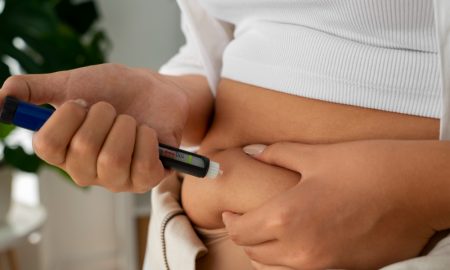
Why Healthy Lifestyle After Bowel Screening Lowers Cancer Risk

Undergoing a bowel screening can do more than just detect potential cancer early—it can serve as a pivotal moment to adopt healthier lifestyle habits that significantly lower the risk of bowel cancer and other chronic diseases.
Recent research highlights how changes made after screening can have a measurable impact on long-term health outcomes.
Lifestyle Changes and Bowel Cancer Prevention
Norway records one of the highest incidences of bowel cancer worldwide. Research suggests that nearly half of all cases could be prevented through simple lifestyle adjustments:
1. Maintaining a healthy weight
2. Regular physical activity
3. Balanced nutrition
4. Avoiding smoking
5. Limiting alcohol consumption

Freepik | Avoiding smoking and other simple lifestyle adjustments could prevent almost 50% of all cancer cases.
Previous studies primarily examined lifetime habits, leaving questions about the impact of lifestyle changes later in life. A new study in the American Journal of Gastroenterology sought to understand whether adopting healthier behaviors immediately after bowel screening could alter risk trajectories.
Screening as a “Teachable Moment”
Researchers from Harvard T.H. Chan School of Public Health, in collaboration with the Song Lab, explored the effects of lifestyle changes after colonoscopy screening. Markus Dines Knudsen, postdoctoral fellow at the Department of Nutrition at the Institute of Basic Medical Sciences, explained:
“Studies have indicated that bowel screening might be a window of opportunity for lifestyle intervention. We wanted to find out what happens if someone improves or worsens their lifestyle after screening and how it affects the risk of developing other major chronic diseases.”
Participants were initially assessed on lifestyle factors including smoking, body mass index (BMI), physical activity, alcohol intake, and diet. Diet questions focused on red and processed meat, fiber, whole grains, dairy, and calcium intake. Follow-ups occurred over several years, generating a lifestyle score from 1 to 5.
Positive Lifestyle Changes Lower Risk
The findings were significant. Each one-point improvement in lifestyle score after screening corresponded to:
14% lower risk of developing bowel cancer
11% lower risk of major chronic diseases
Examples of improvements include increasing physical activity, losing weight, or reducing alcohol intake. These results underscore the tangible benefits of lifestyle changes made even after middle age, demonstrating that it’s never too late to take action.
Unhealthy Habits Increase Risk
Conversely, participants whose lifestyle deteriorated by two points or more faced substantially higher risks:
70% higher risk of bowel cancer
21% higher risk of other chronic diseases
Knudsen emphasized the importance of these findings:
“Even among people who had reduced risk due to screening, adopting less healthy behaviors led to a pronounced increase in cancer risk. This demonstrates that lifestyle choices remain critically important after screening.”
Ongoing Research in Norway

Freepik | KamranAydinov | Adopting healthy habits like yoga and nutritious food after screening can lower cancer risk.
Norwegian researchers, in partnership with the Norwegian Cancer Registry, are taking their work a step further by testing how lifestyle interventions can be integrated into the national bowel screening program. Over a two-year period, participants will receive customized follow-up designed to help them maintain cancer-preventive routines. The study will assess long-term results, from reduced cancer cases to lower mortality rates.
Bowel cancer strikes roughly 5,000 people in Norway every year. The country’s screening initiative invites adults aged 55 to 75 to submit stool samples every two years, aiming for early detection of both cancer and precancerous growths. Beyond identifying illness, the program also presents a moment to motivate healthier living—an opportunity to transform awareness into prevention.
The Impact of Lifestyle Choices
The findings underscore a simple truth: lifestyle changes after screening can save lives. Even modest shifts—more physical activity, better nutrition, or less alcohol—can reduce cancer risk. Ignoring those factors, however, can quickly erode the benefits of early detection.
When screening is paired with ongoing lifestyle support, it becomes more than a diagnostic tool—it’s a gateway to prevention. Prioritizing diet, movement, and other healthful habits after screening can reshape long-term wellbeing and lower the odds of bowel cancer and related chronic diseases.
More in Lifestyle
-
`
How the ‘Ozempic Effect’ Is Changing Clothing Sizes Across the U.S.
Retailers across the U.S. are noticing a striking change on their racks. Plus-size apparel, once in constant demand, is showing up...
September 27, 2025 -
`
Fat Jabs May Cure Cocaine Addiction and Boost Heart Health, New Study Finds
What if the same jab that helps you lose weight could also help you kick a cocaine habit? Sounds wild, but...
September 21, 2025 -
`
Dwayne Johnson Shocks Fans With Dramatic Weight Loss Transformation
Dwayne “The Rock” Johnson stunned the crowd at the 2025 Venice Film Festival with a slimmer look that set social media...
September 20, 2025 -
`
Dwayne ‘The Rock’ Johnson Stuns Fans With Slimmed-Down MMA Fighter Look
Dwayne ‘The Rock’ Johnson isn’t just flexing muscles anymore. In “The Smashing Machine,” Dwayne Johnson strips down the bulk, sheds his...
September 13, 2025 -
`
Here’s How Fat-Blocking Green Tea Microbeads May Aid Weight Loss
Scientists are exploring an innovative way to reduce fat absorption in the body—tiny edible beads made with green tea, vitamin E,...
September 12, 2025 -
`
Why the Heart Is Slightly to the Left and Not Perfectly Centered
The heart is one of the most vital organs in the body, yet its placement often raises questions. Many assume it...
August 16, 2025 -
`
Ozzy Osbourne’s Most Shocking and Beloved Pop Culture Moments
Few figures in rock history have carved out a legacy as vivid and unpredictable as Ozzy Osbourne. Beyond his groundbreaking work...
August 10, 2025 -
`
Are Mono Diets Worth It – or Just a Dangerous Trend?
As summer brings on the pressure to slim down fast, the internet lights up with diet trends promising instant results. One...
August 3, 2025 -
`
Why Motivation Is Essential for Sustainable Fitness Success
Motivation isn’t something that shows up when it’s convenient—it’s something that needs to be built, shaped, and sustained. Many people struggling...
July 27, 2025










You must be logged in to post a comment Login